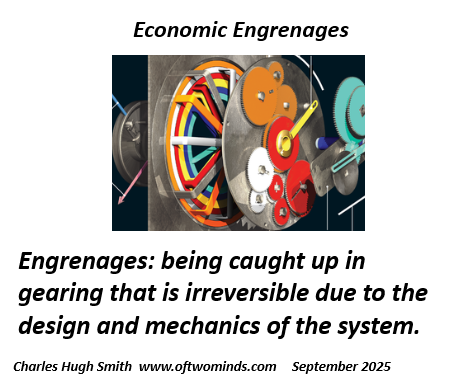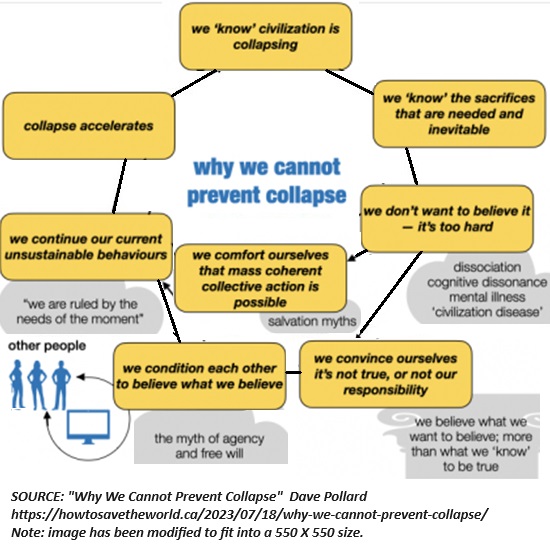Entitled, Demanding--and Shunned
Since we didn't need relationships in a transactional system, we no longer have any.
To connect multiple threads into a coherent understanding, let's start with a real-life story. We're handy but some breakdowns require outside assistance. The fridge failed (GE brand, less than two years old) and it turned out to be difficult to find a repair tech. One had retired, others were swamped, one didn't return multiple calls, another had left the trade for another trade, and GE's own service only covers repairs under warranty (i.e. one year).
One of my wife's cousins had spoken highly of an experienced repair guy, and in leaving the gent a message my wife mentioned her cousin as the source of the recommendation. He had no business listing online; everything was word of mouth.
The gent eventually returned her call, asked for the model/make information, and agreed to swing by to diagnose the problem.
During their conversation the gent mentioned his 40+ years in the appliance / repair business, and that he only does work for people he knows. He no longer responds to strangers recommended by people he knows, as he's had bad experiences with newcomers and will have nothing to do with them. He only returned our call because we were family members of someone he knows.
His list of previous customers numbers in the hundreds, and these trustworthy, respectful people keep him as busy as he wants.
My shorthand for his bad experiences with strangers: they're entitled, demanding, discourteous, and find excuses not to pay him. His response is to shun those customers he doesn't already know, or in our case, family members of people he does know. (He knew two of my wife's cousins.)
Now let's connect a few more threads. Ours is an advocacy system. You want something, you have to advocate for it, often persistently, as "the squeaky wheel gets the grease." Customer service had degraded to the point where the system seeks to reduce costs by grinding down customers so they give up.
Advocacy merges easily into threats. After a trip in Asia, I knew I was on a US-flagged airline when a passenger who'd been accidentally jostled by another passenger snapped, "I'll sue you!" (This is one of those "only in America" things: "I'll sue you!")
The appliance tech mentioned that when a stranger outright refused to pay him and he said he would remove the part he'd just installed, the customer threatened to "call the police."
Threats are tactics, of course, to bulldoze your opponent, but they can also be the emotional response of those who grasp their powerlessness in the system.
Americans confuse rights, entitlements and advocacy. Our rights are rather limited, and are defined by an enormous body of legal rulings. Our entitlements--for example, to receive medical care under the Medicare or Medicaid programs--are often taken as rights, but they're not the same: we may be entitled to care but that isn't a guarantee we'll receive the care, as that depends on the local availability of enterprises who accept Medicare / Medicaid patients.
Providers can bail out of these programs, and those mandated to provide coverage (emergency rooms for example) can close down.
Entitlement leads to demands presented as advocacy which morphs into "it's my right." Well, actually, it's rarely our "right," beyond advocating our position via free speech, filing complaints with regulatory authorities or legal proceedings.
Now let's connect the final set of threads: the difference between transactions and relationships, systems that are based on transactions and systems that are based on relationships--not just immediate family and friends, but extended family ties and reciprocal-help relationships that are the core of community--a much used and abused term for what is largely a hollow slogan.
Ours is a transactional system: everything you need or want is for sale via a financial transaction. nobody needs a relationship to buy whatever they want; they just need money or credit. We approach a complete stranger who is employed by Corporate America or the government, and complete a financial transaction.
In a transactional system, we don't do anything for anyone unless we're paid. OK, help a stranger with a flat tire maybe, but develop reciprocal-aid ties with neighbors and others? We don't have time for those kinds of "investments" that "don't pay off."
Consider the difference between an appliance repair conducted as a transaction and one based on relationships. If the appliance is under warranty, the issuer of the warranty is obligated to arrange a repair by the contractual stipulations of the warranty. ("Some conditions apply," of course, meaning there may be exclusions, limits of liability, etc. Sorry about that, you should have read the fine print.)
The customer and the repair tech are strangers. The transaction is arranged by strangers in a corporate office. This transaction is lauded in the abstract as proof of the "trustworthiness" of the system.
A transactional system works marvelously until it breaks down. For example, the hospital closes due to financial losses, and so the ER is closed, too. We can demand our right to medical care but it's no longer available in our area. Or the warranty repair service is no longer available in our area, sorry.
The fragility of these transactional systems is hidden until they break down. And when they degrade and break down, then we're left with systems based on relationships--systems which have largely vanished in a highly mobile, rootless culture that's distilled everything down to "trustworthy" transactions.
If everyone is constantly moving, there is no way anyone can know members of your extended family because they're scattered thousands of miles apart.
In a transaction-based culture, relationships have little value, so they're depreciated. Why bother maintaining or forming relationships when you can get everything you want or need by staring at a screen?
Until all those hyper-optimized transactional systems start breaking down. Then the value of relationships is suddenly revalued--but few have any reciprocal-aid relationships with practical value. Networking is a superficial, shallow simulacrum of actual relationships, and that's all we have left.
Sure, I'll help you, but only if I personally know someone in your family. This is trust on a different level than the transactional trust of Corporate America or government agencies.
Transactions work great until hyper-optimized transactional systems cease to be hyper-profitable. Then we discover how fragile these systems are to disruption.
Since we didn't need relationships in a transactional system, we no longer have any. Demanding our rights and what we're entitled to isn't going to bring overly complex systems back; once they're gone, they're gone, and we'll be dependent on relationships, which are fundamentally reciprocal in nature.
In other words, you know--and helped--one of my family members, I'll help you. If you didn't, well I'm sorry, I'm busy.
Entitled, Demanding--and Shunned. That's the end-game of depending on transactions as a replacement for all the relationships that have gone by the wayside in a culture that reckons everything boils down to a series of bloodless transactions.
This is the transactional gearing we're caught up in...

...and it maps collapse rather closely.

Check out my new book Ultra-Processed Life and my updated Books and Films.
Become
a $3/month patron of my work via patreon.com
Subscribe to my Substack for free
My recent books:
Disclosure: As an Amazon Associate I earn from qualifying purchases originated via links to Amazon products on this site.
Ultra-Processed Life print $16, (Kindle $7.95, Hardcover $20 (129 pages, 2025) audiobook Read the Introduction and first chapter for free (PDF)
The Mythology of Progress, Anti-Progress and a Mythology for the 21st Century print $16, (Kindle $6.95, audiobook, Hardcover $24 (215 pages, 2024) Read the Introduction and first chapter for free (PDF)
Self-Reliance in the 21st Century print $15, (Kindle $6.95, audiobook $13.08 (96 pages, 2022) Read the first chapter for free (PDF)
When You Can't Go On: Burnout, Reckoning and Renewal $15 print, $6.95 Kindle ebook; audiobook Read the first section for free (PDF)
Global Crisis, National Renewal: A (Revolutionary) Grand Strategy for the United States (Kindle $6.95, print $16, audiobook) Read Chapter One for free (PDF).
A Hacker's Teleology: Sharing the Wealth of Our Shrinking Planet (Kindle $6.95, print $15, audiobook $17.46) Read the first section for free (PDF).
Will You Be Richer or Poorer?: Profit, Power, and AI in a Traumatized World
(Kindle $3.95, print $12, audiobook) Read the first section for free (PDF).
The Adventures of the Consulting Philosopher: The Disappearance of Drake (Novel) $3.95 Kindle, $12 print); read the first chapters for free (PDF)
Money and Work Unchained $6.95 Kindle, $15 print) Read the first section for free
Become a $3/month patron of my work via patreon.com.
Subscribe to my Substack for free
NOTE: Contributions/subscriptions are acknowledged in the order received. Your name and email remain confidential and will not be given to any other individual, company or agency.
|
Thank you, Larry M. ($200), for your beyond-outrageously generous subscription to this site -- I am greatly honored by your support and readership. |
Thank you, Robert S. ($70), for your marvelously generous subscription to this site -- I am greatly honored by your support and readership. |
|
|
Thank you, Wandering Minstreli ($7/month), for your superbly generous subscription to this site -- I am greatly honored by your support and readership. |
Thank you, XX ($7/month), for your splendidly generous subscription to this site -- I am greatly honored by your support and readership. |


























